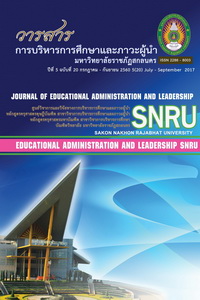

ปัจจัยที่ส่งผลต่อความพร้อมเข้าสู่ประชาคมอาเซียนของโรงเรียนมัธยมศึกษา สังกัดสำนักงานเขตพื้นที่การศึกษามัธยมศึกษาในภาคตะวันออก: การวิเคราะห์พหุระดับ
Factors Affecting the Readiness for ASEAN Community of Secondary Schools under the Secondary Education Service Area Offices in the Eastern Region, Thailand : A Multilevel Analysis
ผู้แต่ง
สายสมร อุบลวัตร์, ประพัฒน์พงศ์ เสนาฤทธิ์, สุขุม มูลเมือง
บทคัดย่อ
การวิจัยครั้งนี้มีวัตถุประสงค์เพื่อ 1) ศึกษาปัจจัยที่ส่งผลต่อความพร้อมในการเข้าสู่ประชาคมอาเซียนของโรงเรียนมัธยมศึกษาสังกัดสำนักงานเขตพื้นที่การศึกษามัธยมศึกษาในภาคตะวันออก 2) ประเมินโมเดลพหุระดับของอิทธิพลที่ส่งผลต่อการเข้าสู่ประชาคมอาเซียนของโรงเรียนมัธยมศึกษาสังกัดสำนักงานเขตพื้นที่การศึกษามัธยมศึกษาในภาคตะวันออก และ 3) ศึกษาอิทธิพลทางตรงและทางอ้อมของปัจจัยในแต่ละระดับที่ส่งผลต่อความพร้อมในการเข้าสู่ประชาคมอาเซียนของโรงเรียนมัธยมศึกษาสังกัดสำนักงานเขตพื้นที่การศึกษามัธยมศึกษาในภาคตะวันออก กลุ่มตัวอย่างเป็นโรงเรียนมัธยมศึกษา จำนวน 76 โรงเรียน ผู้ให้ข้อมูลประกอบด้วย ผู้บริหารสถานศึกษา ครูผู้สอนวิชาคณิตศาสตร์และภาษาอังกฤษ และนักเรียนชั้นมัธยมศึกษา ปีที่ 4-6 ที่กำลังศึกษาในปีการศึกษา 2558 เครื่องมือที่ใช้ในการวิจัยคือแบบสอบถาม แบบมาตราส่วนประมาณค่า (Rating Scale) สถิติที่ใช้ในการวิเคราะห์ข้อมูล ได้แก่ ค่าความถี่ ค่าร้อยละ ค่าเฉลี่ย ส่วนเบี่ยงเบนมาตรฐาน การวิเคราะห์องค์ประกอบยืนยันพหุระดับ และการวิเคราะห์สมการโครงสร้างพหุระดับ วิเคราะห์ด้วยโปรแกรม Mplus 7.2
ผลการวิจัย พบว่า
1. ปัจจัยที่ส่งผลต่อความพร้อมเข้าสู่ประชาคมอาเซียนของโรงเรียนมัธยมศึกษาสังกัดสำนักงานเขตพื้นที่การศึกษามัธยมศึกษาในภาคตะวันออก ประกอบด้วย ตัวแปรระดับบุคคล ตัวแปรระดับห้องเรียนและตัวแปรระดับโรงเรียน รวมทั้งหมด 7 องค์ประกอบ ในระดับบุคคล 3 องค์ประกอบ ได้แก่ ศักยภาพผู้เรียน พฤติกรรมการเรียน และความพร้อมของผู้เรียน ในระดับห้องเรียน 2 องค์ประกอบ ได้แก่ สมรรถนะครู และพฤติกรรมการสอน และในระดับโรงเรียน 2 องค์ประกอบได้แก่ สมรรถนะผู้บริหาร และพฤติกรรมการบริหาร ตามลำดับ
2. ผลการประเมินโมเดลประหยัดหรือโมเดลที่ปรับปรุงแล้ว พบว่า ค่าไค-สแควร์ (χ2) = 128.262 df. = 77 p. = 0.000 χ 2/df = 1.666 RMSEA = 0.032 CFI = 0.959 TLI = 0.942 SRMR (Standardized Root Mean Square Residual) ของ Within = 0.013 Between Level 2 = 0.076 และBetween Level 3 = 0.091 จึงสรุปว่าโมเดลเชิงทฤษฎีที่ผู้วิจัยพัฒนาขึ้นสอดคล้องกับข้อมูลเชิงประจักษ์
3. อิทธิพลทางตรงและทางอ้อมของปัจจัยที่ส่งผลต่อความพร้อมเข้าในการสู่ประชาคมอาเซียนของโรงเรียนมัธยมศึกษาจากการศึกษาครั้งนี้ มีดังนี้ ในระดับบุคคล พบว่า ศักยภาพของผู้เรียนมีอิทธิพลทั้งในทางตรงและทางอ้อมผ่านพฤติกรรมการเรียนต่อความพร้อมในการเรียนของนักเรียน ซึ่งมีอิทธิพลในทางตรงและมีทิศทางเป็นบวกอย่างมีนัยสำคัญ ทางสถิติ ในระดับห้องเรียน พบว่า สมรรถนะของครูมีเฉพาะอิทธิพลในทางตรงต่อความพร้อมในการเรียนของห้องเรียนและมีทิศทางเป็นบวก และสมรรถนะของครูส่งผลต่อพฤติกรรมการสอนอย่างมีนัยสำคัญทางสถิติ ส่วนพฤติกรรมการสอนของครูไม่ส่งผลต่อความพร้อมในการเรียนของห้องเรียน และในระดับโรงเรียน พบว่าสมรรถนะของผู้บริหารมีอิทธิพลในทางตรงและมีทิศทางเป็นบวกต่อพฤติกรรมการบริหารของผู้บริหาร สมรรถนะ ของผู้บริหารและพฤติกรรมการบริหารไม่มีทั้งอิทธิพลทางตรงและทางอ้อมต่อความพร้อมในการเรียนของนักเรียน
Abstract
The purposes of this study were to 1) assess multi-level model of factors affecting the readiness for ASEAN community of the secondary schools under the jurisdiction of the Secondary Educational Service Area Offices (SESAO) in the Eastern Region of Thailand; 2) verify the stated model by utilizing the empirical data; and 3) analyze the direct and indirect effects of factors under study. The data for this study were drawn from the principals, teachers responsible for Mathematics and English subjects, and Grade 12th students enrolled in 76 sampled schools in 2015 academic year via self-administered, rating–scale questionnaires developed by the researcher. By employing regular SPSS computer program and Mplus 7.2, statistics used for the study included frequency, percentage, means, standard deviation, multilevel confirmatory factor analysis, and multilevel structural equation modeling respectively.
The findings revealed that:
1. The multilevel model of factors affecting the readiness of secondary schools under the jurisdiction of SESAO in the Eastern Region of Thailand was composed of 7 major components. There were three components at the individual student level: students’ competence, learning behaviors, and students’ readiness to learn; two components at the classroom (teacher) level: teachers’ competence and teaching behaviors; and two components at the school (principal) level: principals’ competence and administrative behaviors respectively. The theoretical multilevel structural equation model was fit with the empirical data.
2. The adjusted multi-level model as reflected by χ 2 = 128.262 df. = 77 p.= 0.000 χ 2/df = 1.666 RMSEA = 0.032 CFI = 0.959 TLI = 0.942 SRMR (Standardized Root Mean Square Residual) Within = 0.013 Between Level 2 = 0.076 and Between Level 3 = 0.091 was fit with empirical data.
3. In regard to the direct and indirect effects among factors, it was found that: At individual (student) level, it indicated that students’ competence positively affected both directly and indirectly, mediated through students’ learning behaviors, on students’ readiness for learning. At classroom (teacher) level, it indicated that teachers’ competence positively affected students’ readiness to learn in the classroom. The teachers’ competence also positively and significantly affected teaching behaviors. However, teaching behaviors did not significantly affected students’ readiness to learn in the classroom. At school (principal) level, it revealed that the principals’ competence positively and significantly affected administrative behaviors. However, both principals’ competence and administrative behaviors exerted no impact on students’ readiness to learn in school.
คำสำคัญ
ความพร้อมเข้าสู่ประชาคมอาเซียน, โรงเรียนมัธยมศึกษา, การวิเคราะห์พหุระดับKeyword
Readiness for ASEAN Community, Secondary Schools, Multilevel AnalysisNotice: Undefined variable: dataSet in /var/www/html/ArticleView.php on line 116
Notice: Trying to access array offset on value of type null in /var/www/html/ArticleView.php on line 116
บทความทุกบทความเป็นลิขสิทธิ์ของ
Notice: Undefined variable: dataSet in /var/www/html/ArticleView.php on line 116
Notice: Trying to access array offset on value of type null in /var/www/html/ArticleView.php on line 116
เท่านั้น
กำลังออนไลน์: 8
วันนี้: 944
เมื่อวานนี้: 1,136
จำนวนครั้งการเข้าชม: 1,284,497
อาคารบัณฑิตวิทยาลัย ชั้น 2 ตำบลธาตุเชิงชุม อำเภอเมือง จังหวัดสกลนคร 47000
โทร/
แฟกซ์ 0-4297-0093
บรรณาธิการ: รองศาสตราจารย์ ดร.ไชยา ภาวะบุตร
ติดต่อ/สอบถาม: นายธีรเวทย์ เพียรธัญญกรณ์
โทร: 0-4297-0093